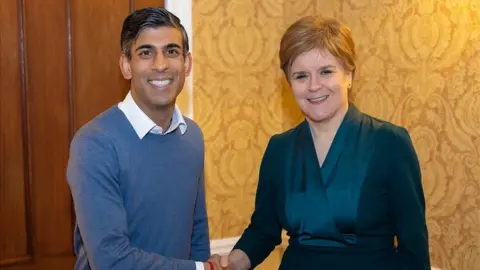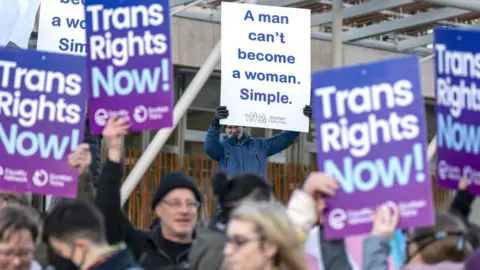Rishi Sunak has concerns about impact of gender reforms
Rishi Sunak has said he is concerned about the potential impact of Scotland's new gender reforms on other areas of the UK.
The prime minister said the government was taking advice on the implications of the reforms "as is completely standard practice".
But he did not say whether Westminster would seek to block the legislation.
Scotland is the first country in the UK to approve a self-identification system for people who want to change gender.
The controversial reforms, which are expected to come into force later this year, lower the age that people can apply for a gender recognition certificate (GRC) from 18 to 16.
They also remove the need for a medical diagnosis of gender dysphoria, with applicants only needing to have lived as their acquired gender for three months rather than two years - or six months if they are aged 16 or 17.
The Scottish government believes the existing process can be intrusive and distressing and put people off applying for a GRC.
But there have been concerns about the potential impact on the Equality Act and its protections for women-only spaces, as well as the implications for UK-wide documents and some social security benefits.
This has led to speculation that the UK government could use Section 35 of the Scotland Act to prevent the new law coming into force.
The provisions allow Scottish Secretary Alister Jack to prevent legislation passed by the Scottish Parliament from receiving Royal Assent if he believes it would have an adverse effect on issues that are reserved to Westminster.
He will need to decide whether to do so by the middle of next week, and would almost certainly face a legal challenge from the Scottish government if he did block the reforms.

Speaking to the BBC's Good Morning Scotland programme, Mr Sunak said the government was waiting for some "final advice" before deciding what to do.
He added: "Obviously this is a very sensitive area and I know there were very robust debates and exchanges on it as the bill was passing in Scotland.
"What I'm concerned about is the impact of the bill across the United Kingdom. As is entirely standard, the UK government would take advice on that.
"There may be impacts across the UK that we need to be aware of and understand the impact of them.
"That is what we are doing, and once the government has received final advice it will set out next steps."
The Scottish government has previously said that "any attempt by the UK government to undermine the democratic will of the Scottish Parliament will be vigorously contested".
 PA Media
PA MediaThe SNP's leader at Westminster, Stephen Flynn, said the question of whether the UK government would provide Royal Assent went beyond the issue of gender recognition and people's views on it.
He said: "This is about democracy. The Scottish parliament has voted in favour of legislation that sits within devolved competencies and it is incumbent upon Westminster to ensure that the legislation is passed in full".
Mr Sunak started a two-day visit to Scotland - his first since becoming prime minister - on Thursday evening, when he had private talks with First Minister Nicola Sturgeon at a hotel in Inverness.
The discussions were described as being "cordial", with the gender reforms being discussed alongside the NHS, the economy and Scottish independence.


Rishi Sunak is stressing how normal and reasonable it is for his government to carefully consider the impact of a Scottish law on all of the UK.
It's true that the Scotland Act which set up the Scottish Parliament provides for that kind of scrutiny.
There have been occasions when UK ministers have successfully challenged in court Holyrood's power to make laws in certain areas.
But never before have they intervened to stop a Scottish bill, passed by MSPs, from becoming law on the basis that it might have unwelcome impacts on UK legislation.
If that's what the Scottish secretary, Alister Jack, decides to do with Holyrood's gender recognition reform bill, a very big row and a court clash with the Scottish government is sure to follow.
Mr Jack is expected to consider some final advice over the next few days before making a decision.

The two governments made a joint announcement on Friday about the location of two "green freeports" in Scotland, which will be at sites on the Cromarty Firth around Inverness and the Forth on the east of Scotland.
The scheme will see tax incentives and lower tariffs being used in a bid to boost investment and economic growth in the two areas, with the aim of creating total of 75,000 jobs.
Mr Sunak also visited Invergordon on Friday morning, where he rejected criticisms by Ms Sturgeon of UK government plans to limit the impact of public service strikes.
The prime minister said it was "right and responsible" to change the law to guarantee a basic level of service in areas like health and education when there are strikes.
Ms Sturgeon told the Scottish Parliament on Thursday that she strongly opposed the legislation and accused the UK government of trying to reduce workers rights and of pouring fuel on the fire of industrial tension.
